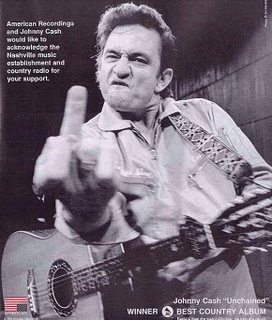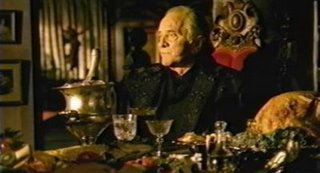
I even remember his variety show in the late sixties and early seventies. If I remember right, it was on at 7 oclock on Wednesday night and we would watch and that's where I first saw Joni Mitchell, Bob Dylan, Neil Young,The Guess Who and a host of other great acts. The guests would come out and do their big hit and then later in the program, they would join Johnny and they would sing together. It is still very cool to watch Johnny and the Guess who sing "Share The Land". I have some of his shows on a bootleg DVD. Johnny fell out of favor with the record companies and his stuff became harder to find. in 1993, he got together with Rick Rubin and Rick revitalized his career. Those recordings are the ones that I can not get out of my CD player at this time. They are holding the player hostage. With Johnny's cover of Trent Reznor's "Hurt", he has become beloved by a whole new generation. God Bless him. The one that is truly on my player is his latest and the last recordings before he died.

His newest one is American VI and, to me, it's the strongest, most emotional one he has done. This is the one he recorded before his death and they hold a personal place in my brain.
This one hurts to listen to. But that's OK, it's supposed to.
Here are some of the reviews:
The ethical questions surrounding this final album in the American Recordings series are as unavoidable as they are, ultimately, peripheral. While the vocal tracks were recorded in the months just prior to Johnny Cash's passing in September 2003, the arrangements weren't undertaken until two years later. And though producer Rick Rubin had become a trusted friend, the Man in Black wasn't around to approve or disapprove, let alone guide, the final sessions. However, if the pure power of these recordings doesn't quiet the skeptics, nothing will. With Heartbreakers Mike Campbell and Benmont Tench and slide guitar session pro Smokey Hormel on board (all three of whom appear on earlier Cash albums), along with guitarists Matt Sweeney and Johnny Polansky, the sound is stately and acoustic, but rarely staid, even as the dynamics of earlier recordings in the series are absent. Instead, the songs have a measured, elegiac intensity, the sound of musicians choosing their notes carefully and making just the right choices.
The songs Cash sings are, unsurprisingly, confessional and reflective: his mortality and his mistakes, his maker and his salvation, and the loss of his wife June and the end of his career may have weighed on his mind, but in these songs he both embodies and transcends his personal history. On "God's Gonna Cut You Down," as the musicians clap and stomp behind him, his voice cuts through the air like that same avenging hand. On the new original "Like the 309"--the last song Cash ever wrote--he cops to being short of breath, and that voice becomes a metaphor for what each of us will one day face. On Gordon Lightfoot's "If You Read My Mind," Rubin flirts with overwhelming the damp bittersweetness of Cash's phrasing in tasteful atmospherics, but the voice is implacable, hitting and finding notes one never expected he'd have the will to find. Likewise, it's hard to believe this is his first recording of Ian Tyson's "Four Strong Winds"; the elemental narrative seems to have been written for him. Two songs, however, Cash has recorded before: the born-again hymn "I Came to Believe" and the final spiritual, "I'm Free from the Chain Gang Now." The latter especially is a definitive testament, as is his version of Bruce Springsteen's "Further On (Up the Road)." "One sunny morning we'll rise, I know / And I'll meet you further on up the road," he sings. If only, John, if only. --Roy Kasten
To these ears, each American album had something to set it apart from the others & if I were to characterize this (hopefully) latest installment, I'd say A Hundred Highways is the most lonesome sounding of the lot. The sound of a man alone. Stripped of youth, health & any illusions.
All of the records in this series could be considered sparse in terms of production & accompaniment. Producer Rick Rubin acts more like a still photographer trying to capture the moment, rather than pull any strings. Which is one reason why they've all been good. He just let Cash be Cash. And in terms of all their previous work together I have to say, Highways is the most low key. It's also one of the most initimate. No Fiona Apples moaning in the background. No flashy covers like "Rusty Cage" or "Hurt". No frills at all. Just that voice & maybe a little acoustic guitar & organ. As he's so often proved, Rubin has good taste & this album is a far cry from some sort of open casket funeral.
"Help Me" starts things off & the fragility in Cash's voice cannot be denied. For some this isn't easy to take. The song is a plea & the end result is more heartbroken than desperate. "God's Gonna Cut You down" is easily the most rousing number on the album & Cash's voice comes across like thunder that is soon to die down in the distance.
As many have pointed out "309" is the last song he wrote. As any fan knows, The Man In Black was fond of train songs & it serves as a fitting epitaph, completely void of any self pity. It's a song about acceptance rather than resistance. One listen to the Hank Williams cover, "Evening Train" & its not hard to tell what inspired it. Perhaps Cash tossed in his own version just to point that out.
Where Americans III & IV feature covers from the likes of Nine Inch Nails & Depeche Mode, any attempt to reach a new fan base is laid to rest in choices like "Read My Mind" & "Four Strong Winds". Gordon Lightfoot's classic is typical AM fare while "Winds" is mostly familiar to fans of Neil Young. For my money, Cash steals them both for his own, bringing a gravitas that lends each a new meaning. And though I'm not a particularly a Springsteen fan, he's always seemed tailor made for Cash. Further Up The Road ranks up there with his classic take on Highway Patrolman. As for things like, "Rose Of My Heart", the conviction of Cash's delivery puts to rest any fears of Hallmark sentimentality.
As the song self-depricatingly suggests, Cash was indeed a "legend in his time "& this album is best thought of as a quiet, meditive coda to a career that began with the immortal line," I shot a man in Reno just to watch him die". True, the ravages of illness are apparent & some people just won't be able to get beyond that. But if you're able to, you'll be rewarded.
.
1 comment:
there will never be anyone quite like johnny cash.
Post a Comment